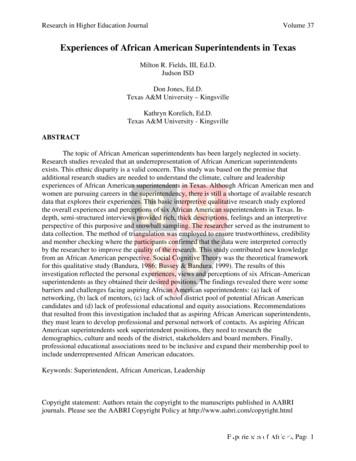AFRICAN AND AFRICAN AMERICAN CULTURAL UNITY DAY
AFRICAN AND AFRICAN AMERICAN CULTURAL UNITY DAYIN HONOR OF BLACK HISTORY MONTH, FEBRUARY 28, 2015
CONFERENCE SUMMARY
SponsorsAfrican HeritageAfrican ImmigrantBlack Minds Matter 2Family Outreach &Engagement ProgramFamily Outreach &Engagement ProgramA Not for Profit AdvocacyAgencyMelody HamesSinora FreelandMohamed AliSemmert HaileAli RoblehGigi Crowder
Intent of heartAfrican Heritage“Before us there were otherswho were torn apart, who ismaking them whole?” Peres Owino comments on hermovie BoundOur desire is to become whole,healthy in mind, body and soul.Doing so honors our ancestorsand strengthens our future.African ImmigrantAll Africans are welcome fromNorth, South, East and West.Many African Immigrants haveno idea what our Ancestorsendured during slavery andmany African Americans haveno idea about Africa. Today isthe day we begin to learn fromeach other’s experience.Black Minds Matter 2This important conference willsupport us toward our goal ofidentifying and promotingequitable services for all blackpeople that are honoring of ourpast, culturally responsive, andbetter address our behavioralhealth needs.
ContributorsFalafel’s Drive-InJubbaKabab and Curry’sZeniVMC FoundationNAMI Santa Clara 336.39 donation 250.00 donationThe First OriginalJamaica RestaurantNoah’s BagelsSafewaySave MartStarbucks
Village Discussion1. Barriers to opencommunication2. What can we do toopen communication?Stereotypical informationabout both groups Bad information Language and culturalmindsets Individual vs group mentality Cultural differences fromAfrican to African andAfrican American to AfricanAmericanMore conversation, festivalsand sharing of foodTime to interact with oneanother Bringing children togetherwould make a bigdifference Frequent communication toget rid of the stereotypeswith children/ all malegroups and all femalegroups3. How does this affectour mental health? Feelings of isolation Language/ cultural barriers Not feeling connected Not knowing how to befriendsdefinition/interpretation offriendship differ Sense of “depth” in the familyis missing Feelings of fear Paranoia (media portrayals) Need to get out of the box Disappoinment
Village Discussion cont’d4. What are culturallycompetent services? Empower the family Stigma attached/ distrust ofdoctors Spiritual differences No faith in the system Language barriers (from thedoctors as well) We are reactionary-needservices that address truth/make people feel safe/proactive services5. What are the nextsteps? Doctors that understand ourcultures/ men to men,women to women, moreBlack doctors Knowing the “code” Need more funding andpeople of color at thedecision making table Evidence based practicesbased on what works for us Prayer, spirituality, loveSee question 2
Conference Images
Evaluation SummaryConference Evaluation SummarySeries1“ I felt that the event was put togethervery well!”“I would like to see more conferencesabout African cultures.”“Whole experience was veryenlightening.”“I like the idea of the African diasporiccommunity uniting.”Series4Series520Number of Responses“Great to hear from the youth andAfrican Elders.”Series325Selected Responses:“This program was really helpful. Also itwas worthwhile.”Series2151050123456789Evaluation Questions101112131415
Sep 21, 2015 · AFRICAN AND AFRICAN AMERICAN CULTURAL UNITY DAY IN HONOR OF BLACK HISTORY MONTH, FEBRUARY 28, 2015. CONFERENCE SUMMARY. Sponsors African Heritage Family Outreach & Engagement Program African Immigrant . no idea about Africa. Today is the day we begin to learn from each other’s experience. Bla
4. Cultural Diversity 5. Cultural Diversity Training 6. Cultural Diversity Training Manual 7. Diversity 8. Diversity Training 9. Diversity Training Manual 10. Cultural Sensitivity 11. Cultural Sensitivity Training 12. Cultural Sensitivity Training Manual 13. Cultural Efficacy 14. Cultural Efficacy Training 15. Cultural Efficacy Training Manual 16.
African-Americans in the Early Twentieth Century 1895-1928 Third Written Paper on African American Writing Assignment due April 9 by 11:50 p.m. Week 11: The African-American Odyssey 17. African Americans and the 1920s 1918-1929 Week 12: The African-American Odyssey 18. Black Protest, the Grea
that student populations across the state are 51.8% Hispanic, 29.4% Anglo, 12.7% African American and 3.7% Asian. Texas has 1,025 school districts, of which 27 are African American superintendents and 7 are female African American. Current Trends Currently, the issues of African American men in school leadership may seem somewhat outdated.
9. Increase attendance and reduce absenteeism rates for African American/Black students 10. Increase the rate of freshman on-track for African American/Black students 11. Increase graduation rates for African American/Black Students 12. Increase the post-secondary enrollment rates of African American/Black students high school
American writers used artistic expression as key modes of political protest, creative affirmation of self, cultural validation, and social reform. Lectures will provide social and cultural background to the literary works discussed in class. Department: African & African American Studies Course: AAS 185 Title: African American Religious History
Shaded Lives: African American Women and Television B e re tta E. S m i th - S h om ad e N on f i c ti on African Americans in Television: Behind the Scenes Gre g ory A d am o N on f i c ti on On the Real Side: A History of African American Comedy M e l W atki n s N on f i c ti on Dancing Many Drums: Excavations In African American Dance Th om .
Celebrating African American History Month 2018 2. African American Transportation Innovators Knowledge of history can inspire us all to greater heights, give us examples to follow, goals to reach, and pride in our legacy Among CUTR’s important goals is to continue to attract a talented and diverse workforce and to
toute la chaîne alimentaire, depuis la production primaire jusqu’à l’assiette du consommateur. La Commission du Codex Alimentarius – un lieu de débat où traiter des questions nouvelles et difficiles Après 45 ans d'activité, la Commission du Codex Alimentarius conserve toute son actualité et il serait difficile d'envisager un monde sans elle. La Commission est toujours prête à .























